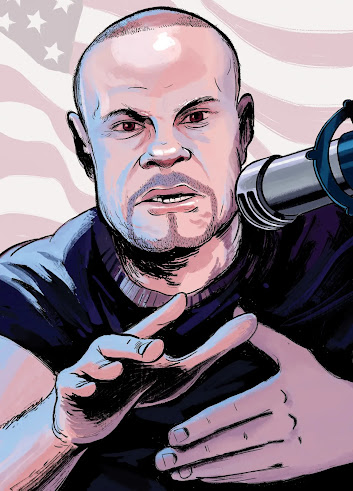The somewhat less than genial-appearing man, pictured above, is Dan Bongino. Bongino is described by Wikipedia as "an American right-wing political commentator, radio show host, and author." Bongino was recently profiled by Evan Osnos in The New Yorker, in an article titled "Maga-Phone." Online, the article bears a different title, "Dan Bongino and the Big Business of Returning Trump to Power."
Bongino served for a number of years in the Secret Service, where he was, for a time, assigned to protect President Obama. Osnos quotes Bongino on Obama as follows: "From what I saw, he was a wonderful father and a wonderful man, and he was very, very nice and very kind to me." That quote dates from 2011. Bongino subsequently denominated President Obama as "the most corrupt president in U.S. history."
This changed view of President Obama coincided with Bongino's decision to enter the world of right-wing media (first appearing as a frequent guest on Infowars, the talk show hosted by Alex Jones). Wikipedia provides this description of Jones:
Alexander Emerick Jones (born February 11, 1974) is an American far-right radio show host and prominent conspiracy theorist. He hosts The Alex Jones Show from Austin, Texas, which the Genesis Communications Network syndicates across the United States and online. Jones's website, InfoWars, promotes conspiracy theories and fake news, as do his other websites NewsWars and PrisonPlanet. Jones has provided a platform and support for white nationalists, giving Unite the Right attendee and white supremacist Nick Fuentes a platform on his website Banned.Video, as well as serving as an "entry point" to their ideology.
The New Yorker article on Bongino has a point to make, as suggested by the title of the online version. Here is the point: What we see in the online political media (the right-wing political media, in this case) is not, actually, a presentation that stems, mainly, from genuine political concern and commitment. Mostly, what we see is business advertising. Bongino, Jones, and others like them, are in the "business" of selling political opinion and political outrage, and the more outrageous the advertising can be, the better the political opinion sells.
This does pose a problem for the expected operation of our political democracy. Osnos, citing to something I have written about before, notes that when outrage sells, and is sold as the truth, someone, sometime, sooner or later, is going to ask this question:
As Osnos says, this question, which was asked at a perfectly peaceful presentation by Charlie Kirk, another right-wing commentator, and the founder of Turning Point USA, "captured the perils of living in a nation beset by information warfare: if January 6th made anything clear, it was that some number of Americans will eventually abandon a distinction between rhetorical battle and the real thing. Bongino's business thrives in that borderland ... where the best way to stay safe is to buy the shotguns and holsters that he advertises on his show."
The danger of the Bongino approach to "news," the "information warfare" approach, is that people will start taking the advertising as a description of the real thing. As conservative columnist Ross Douthat implores us, "Let's Not Invent a Civil War."
In his profile of Bongino, Osnos provides us with an analysis only - and a very good one, I think - but he doesn't have an answer for us. He doesn't tell us what we need to do about the merchandising of political outrage, now that it has become a significant media business (and with some examples on the non-right-wing side of the political outrage business, too).
I do think it is important to understand what's happening with media businesses based on the sale of political outrage - and, again, I suggest that this is not a phenomenon that comes to us from the right-wing only. Still, understanding the problem is only step one. There does need to be an effort to counteract a phenomenon that is leading us to a warfare that will be "real" not just "rhetorical."
My best advice, which is at least worth thinking about, is that the way to undermine businesses that are based on political polarization is to eliminate the polarization itself. In other words, the antidote to outrageous political attacks BY people like Bongino is not to launch similar attacks ON people like Bongino (and I'd count former President Trump as one of those).
Rather than attacking the opposition, and giving as good as you got, it might well be better to find ways to demonstrate that there isn't, actually, the hypothesized "polarization" in the first place. We do know, when we think about it, that we are standing mostly on "common ground." We are, with no doubt about it at all, "in this together."
Finding a way to reconcile our polarized politics is easier said than done, of course, but the principle can be clearly deduced from the science of rhetoric. Any long term follower of this blog (I'm not really sure there are any) will perhaps remember what I said in 2019:
Image Credits:
(1) - https://www.newyorker.com/magazine/2022/01/03/dan-bongino-and-the-big-business-of-returning-trump-to-power
(2) - http://www.danieltrichards.com/e-loquence-concede-to-win/



No comments:
Post a Comment
Thanks for your comment!